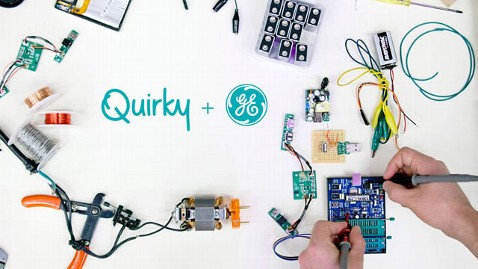GE to Release Patent Trove to Inventors on Quirky

(Image credit: Quirky)
While many companies protect their patents like precious, money-making offspring, GE and social product development company Quirky have partnered to allow "at-home" inventors access to thousands of lab-tested patents.
GE, which traces its roots to Thomas Edison and is based in Fairfield, Conn., and Quirky, a four-year old company based in New York City, appear to be as different as can be.
Not so, says Ben Kaufman, founder of Quirky.
"There's one thing we both have in common, believe it or not. We both stand for invention. We believe humans should leave the world a better place than they found it, and invention is a vehicle for that," he said.
GE's famous advertising slogan is, after all: We bring good things to life.
"There is no other company like GE that is a thought leader in invention," Kaufman said. "We are a company that set out four years ago to make invention accessible."
Quirky's business model allows anyone to become an inventor, Kaufman said. It uses crowdsourcing to develop and provide feedback and shares up to 30 percent of any resulting revenue if a product is brought to market.
As part of the partnership announced on Wednesday, GE will release thousands of patents over time to Quirky's online community of inventors starting in May.
Initially, 200 patents will be available for any member of the public to view, and eventually "thousands" will become available. Quirky boasts that it brings three products to market every week.
Beth Comstock, GE's senior vice president and chief marketing officer, said she applauds Quirky's speed in product development.
"We admire Quirky's speed, collaboration and inventiveness and by opening up lab-proven technology and patents to everyday inventors we can help inspire new ideas and accelerate advanced manufacturing innovation," she said in a statement.
Quirky and GE are not disclosing the terms of their agreement, but Kaufman said the revenue share for inventors is the same as it has always been: 30 percent of revenue for items sold through Quirky's website and 10 percent for items sold in retail stores. Quirky takes care of the manufacturing and distribution.
"We haven't the changed reward structure in the four years we've been doing this, and we don't plan to," he said.
Asked if inventors could get a better deal developing and selling a product on their own, Kaufman said Quirky's revenue offer is three to five times market royalties. Not only do inventors get paid, but Quirky's "collaborators," or those who offer feedback to develop a product, get a cut too.
The average Quirky product is owned by 1,000 people and there are some inventors on the site making millions of dollars a year, Kaufman said.
Some of the patents available will include optical systems, such as holographic technologies and ultra-high barrier technology which enables thinner electronic devices. But you don't need an engineering degree to be an inventor with these patents, Kaufman said.
"We're here to make invention accessible. It allows people who are stay-at-home moms and retirees to become inventors," he said.
Also part of the partnership, GE and Quirky hope to co-develop a line of app-enabled products.
"It's one of the most exciting categories in consumer products," Kaufman said.
The two companies invite the public to submit ideas at Quirky.com/GE and will review the first round of product ideas on April 17.